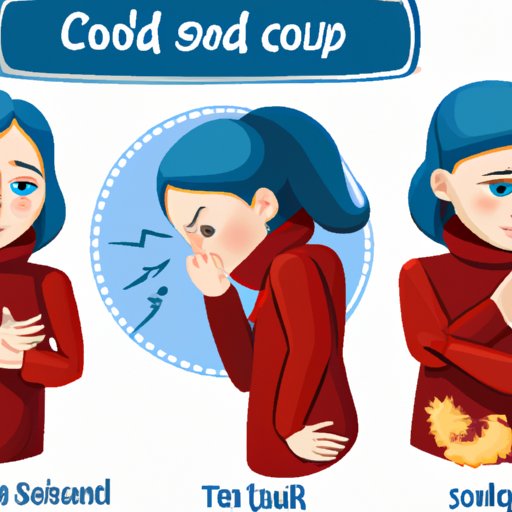
Introduction
Do you know how to recognize the early signs of a cold? It’s essential to understand common cold symptoms to take preventive measures and ease your symptoms. While the common cold is a mild illness, it can often lead to more severe illnesses if left untreated. In this article, we will discuss the ten common symptoms of a cold, including sneaky signs, natural remedies, and a guide on when to seek medical attention.
10 Common Symptoms of Cold You Need to Watch Out For
1. Runny or stuffy nose.
One of the most common symptoms of a cold is a runny or stuffy nose. Your body produces more mucus than usual to help flush out viruses from your body. You might experience a clear or yellowish discharge from your nose.
2. Sore throat.
A sore throat can be a symptom of a cold. It occurs when the back of your throat becomes irritated and inflamed. You may experience difficulty swallowing and talking due to the discomfort.
3. Sneezing.
Sneezing is a common symptom of a cold that helps expel viruses from your body. Your body recognizes the cold virus as a foreign substance and triggers a response to eliminate it.
4. Cough.
A cough is your body’s way of trying to get rid of mucus and irritants from your upper respiratory system. It may be dry or produce mucus, and it can persist long after other cold symptoms resolve.
5. Fatigue.
Cold viruses cause your immune system to overwork, leading to fatigue and exhaustion. You may feel weak and tired and have trouble concentrating on your daily tasks.
6. Headache.
A headache can be a symptom of a cold due to sinus pressure and inflammation. You may experience pain and pressure around your forehead, eyes, and cheeks.
7. Body aches.
Body aches and muscle soreness are common symptoms of a cold, and are caused by your body’s response to fighting the virus. You may feel achy or have tender muscles throughout your body.
8. Mild fever.
A fever of 100.4°F or lower is a common symptom of a cold. The fever is your body’s natural response to fighting the infection.
9. Watery eyes.
Watery, teary eyes are a symptom of a cold that results from nasal congestion and drainage irritating the eyes.
10. Loss of appetite.
A cold can cause a loss of appetite, making it difficult to eat. It is important to stay hydrated and nourished during a cold, so small, frequent meals and fluids can help.
The Sneaky Signs of a Cold: How to Recognize Them Early
Recognizing the sneaky signs of a cold can help you take preventive measures and ease symptoms early. These sneaky signs may include:
– Unusual fatigue
– Shortness of breath
– Chills and body aches
– Nausea or vomiting
– Diarrhea
You may also experience these signs before the onset of common cold symptoms. Recognizing these signs early can help you take preventive measures such as sanitizing your surroundings, washing hands frequently, and resting. If you experience these symptoms, take extra precautions and seek medical attention if they persist.
What Your Body is Trying to Tell You: Understanding the Symptoms of Cold
Understanding your body’s response to the cold virus can help you interpret your symptoms. For example, coughing and sneezing help expel the virus from your body while a fever signals that your body is fighting the infection.
A sore throat may occur due to postnasal drip from a congested nose, while body aches occur due to inflammation from your immune system reacting to the virus. Understanding what your body is trying to tell you can help you take preventive measures and ease symptoms.
5 Natural Remedies to Soothe Your Cold Symptoms
While there is no cure for the common cold, several natural remedies can help ease symptoms.
1. Drink warm liquids
Drinking warm liquids such as tea or chicken soup help soothe sore throats and relieve congestion.
2. Honey and Lemon
Honey and lemon are natural decongestants that can help soothe a sore throat. Add honey and lemon to warm water to create a sore throat remedy.
3. Saline nasal drops
Saline nasal drops help relieve nasal congestion by loosening mucus and flushing out irritants.
4. Ginger
Ginger has anti-inflammatory properties that can help relieve sore throats and ease congestion. Ginger can be consumed in tea or added to soups and stews.
5. Vitamin C
Vitamin C is an immune booster that can help shorten the duration of colds. Consuming foods high in vitamin C, such as citrus fruits and leafy greens, can help ease cold symptoms.
When to Seek Medical Attention for Cold Symptoms: A Guide for Patients
Most colds resolve on their own without medical attention. However, if you experience severe symptoms or have a high fever, it may be time to seek medical attention. If you experience difficulty breathing, chest pain, persistent vomiting, or confusion, seek medical attention immediately.
Conclusion
In conclusion, understanding the common symptoms of a cold and recognizing them early is important for taking preventive measures and easing symptoms. Natural remedies can help soothe symptoms, and medical attention should be sought if severe symptoms persist. Remember to stay hydrated, get enough rest, and keep your surroundings clean to prevent the spread of cold viruses.





